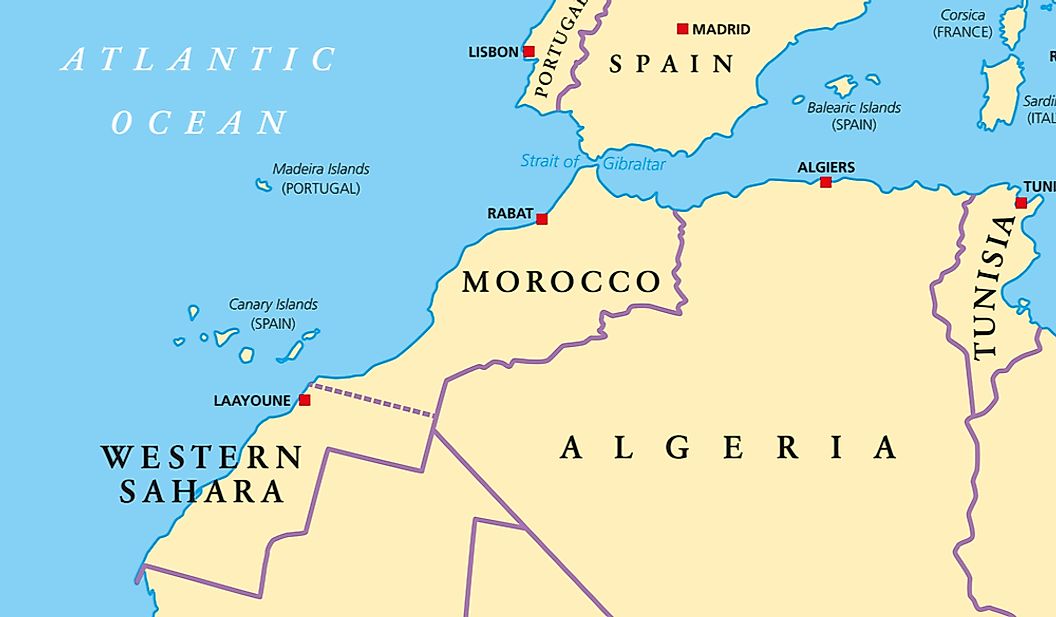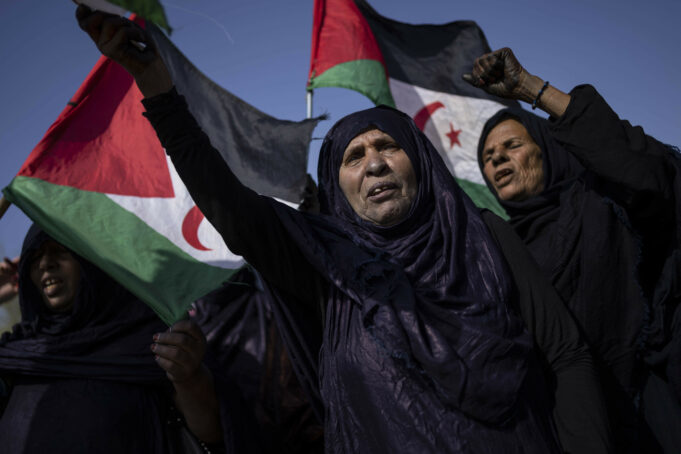The freedom struggle for Western Sahara, a state in Northwest Africa, was recently discussed by experts worried about increased violence between Sahrawi Arab Democratic Republic freedom fighters and Morocco, which has occupied the country for decades.
Over the past year, fighting between the kingdom of Morocco and Western Sahara has grown. Participants in the online session talked about the history of the conflict and the ongoing fight over what is often called “Africa’s last colony.”
Panelists said there is real danger the conflict could become a wider war that pulls in Algeria, Mauritania, France, America, and groups like Al-Qaida in the Maghreb.
“You have a number of nonstate acters in the region who have been over the past two decades causing significant degradation of the security situation,” warned Dr. Jacob Mundy, professor and director of Peace and Conflict Studies at Colgate University. Regional vulnerability followed Libya’s collapse in 2011 under a bombardment of U.S./NATO bombs. The destruction of the regime of Muammar Gadhafi unleashed a “torrent of weapons” in the area, Dr. Mundy said during the webinar.
Regional violence and extremist groups have increased, spilling over into West African countries and worsening relations between Morocco and Algeria, Dr. Mundy added.
Panelists said the Biden administration has not undone former President Donald Trump’s recognition of Morocco’s claim to the Western Sahara, emboldening the kingdom, which was applauded by the U.S. for expanding diplomatic relations with Israel. “It was clear from the beginning that the two countries had undergone a diplomatic rapprochement, strengthening bilateral ties and cooperation in the fields of trade, tourism, and defense,” reported the Times of Israel.
Morocco has also told the United States that she can bring stability to North Africa. In exchange, the U.S. would not oppose the kingdom’s grip on Western Sahara and support Morocco’s relationship with Israel.
Advocates and supporters of Saharawi self-determination have lost appeals to President Joe Biden to end the policy. The U.S. move came weeks after Morrocco violated a 1991 ceasefire agreement by breaching a buffer strip between Western Sahara and Morocco. It prompted a return to armed struggle by the Polisario Front, a Saharawi resistance group.
The U.S. position is contrary to the official positions of the United Nations, the African Union, the European Union, and the International Court of Justice. The Biden administration is taking a no comment position on Trump recognition of Morocco’s occupation, said Bill Fletcher, who moderated the webinar. He is a former executive director of TransAfrica, a group which once lobbied for Africa and the Caribbean.
The webinar panelists Nov. 2 agreed the embrace of Morocco undermined U.S. credibility as a broker on Western Sahara, which has been home to a United Nations peacekeeping force. The UN Security Council recently voted 13-0 with abstentions of Russia and Tunisia to extend the United Nations Mission for the Referendum in Western Sahara (MINURSO) for another year. The UN established MINURSO in 1991 to monitor a ceasefire agreement between the two sides and a referendum on self-determination for the Saharawi people.
The UN resolution emphasized the need for a “realistic, practical, enduring and mutually acceptable political solution based on compromise” for the region. “It was very weak. It was essentially an affirmation of the status quo without acknowledging a war has restarted and without acknowledging regular reports of human rights abuses within the occupied territories,” said Mr. Fletcher. The United States championed the UN resolution. “It seemed like a Biden administration attempt to kick the can down the road,” added Mr. Fletcher.
But, he said, the U.S. is not dealing with the potential for wider war and more regional destabilization.
Katlyn Thomas, an attorney and former MINURSO official, said the U.S. should care about Western Sahara because the Saharawi people want a democracy. “The Saharawis want to establish what would be essentially a democratic system of government in Western Sahara which would be one of the few democratic type of governments in the Middle East, North African area,” said Ms. Thomas.
The Campaign to End the Moroccan Occupation of the Western Sahara in partnership with the Institute of the Black World 21st Century and Pan African Unity Dialogue sponsored the webinar. “The aim was to break the silence on the Western Sahara,” explained Mr. Fletcher, who is also co-coordinator of the Campaign to End the Moroccan Occupation of the Western Sahara.
Webinar panelists said U.S. silence reflects America’s hypocritical history of chiding nations for undemocratic practices while hindering self-determination.

History of the problem
Once called Spanish Sahara, the area has been in dispute since Spain relinquished it in 1975 and instead of granting independence essentially turned the area over to Morocco. In February 1976, freedom fighters declared Western Sahara to be the Saharawi Arab Democratic Republic, supported by allies like Algeria. An estimated 173,000 Saharawi refugees have been living under harsh conditions in neighboring Algeria for 40 years. The five refugee camps rely primarily on assistance from the World Food Program and the UN Refugee Agency. An estimated 58 percent of Saharawi refugees are subject to food insecurity and opportunities for self-reliance and employment are extremely limited.
The Polisario Front controls 20 percent of mostly barren desert, while Morocco controls 80 percent of Western Sahara. The Polisario Front fought for independence from Morocco from 1975 until a 1991 ceasefire negotiated by the UN and OAU. The UN called for a Saharawi vote to accept or reject independence but it never happened. Morocco wants to keep Western Sahara under its control and give a level of self-government. Saharawis want full freedom and independence.
An African problem?
Panelist Sidi Omar, the Polisario ambassador to the UN, said the crisis is causing a dilemma for the African Union and African governments. Morocco and the Saharawi Arab Democratic Republic are African Union members. Morocco was a founding member of the Organization of African Unity which later became the African Union but withdrew in 1984 when the OAU accepted the Saharawi Arab Democratic Republic as a member state.
It was the OAU that initially brought the issue of Western Sahara to the UN Security Council, said Mr. Omar. Morocco now opposes African Union involvement in Western Sahara and has lobbied for other countries to support the kingdom’s position. The situation is also awkward because it is not the typical problem of a “foreign occupier,” in Africa, but a “domestic occupier,” he said. “We’re talking about an African country which still occupies illegally parts of another African country.”
African disunity and outside meddling have exacerbated a problem that could be resolved if Africans alone dealt with it, Mr. Omar argued.
Why Morocco wants Western Sahara
Morocco’s lust for Western Sahara has been blamed on a “disease of expansionism” that includes claiming parts of Mauritania, Algeria, and Mali. However, the real reason for keeping the Western Sahara may lie in the area’s rich natural resources. The Western Sahara U.S Geological Survey says the area holds over 72 percent of all phosphate rock reserves used to make organic fertilizer worldwide. According to the “Global Fertilizer Market by Segments, Region, Company Analysis & Forecast” report released in March, the global phosphate fertilizer market will be worth more than $93.9 billion by 2027, up from $83.5 billion in 2020. Western Sahara also has offshore fisheries.
Supporting the autocratic regime in Morocco, which is backed by France and the United States, does not guarantee peace and stability in North Africa, webinar panelists warned. “It’s absurd. It’s insulting to the continent of Africa,” said Mr. Fletcher.













